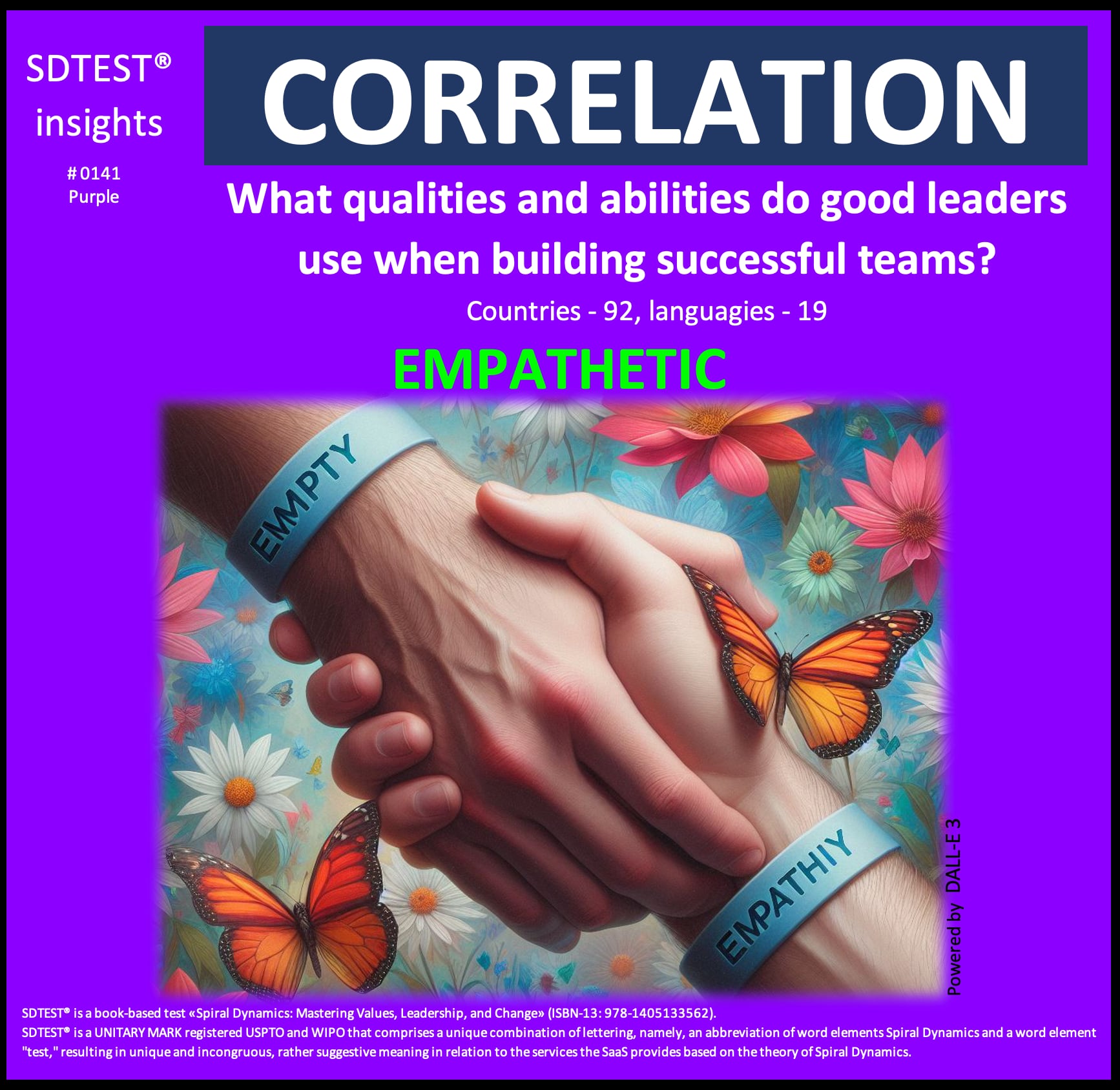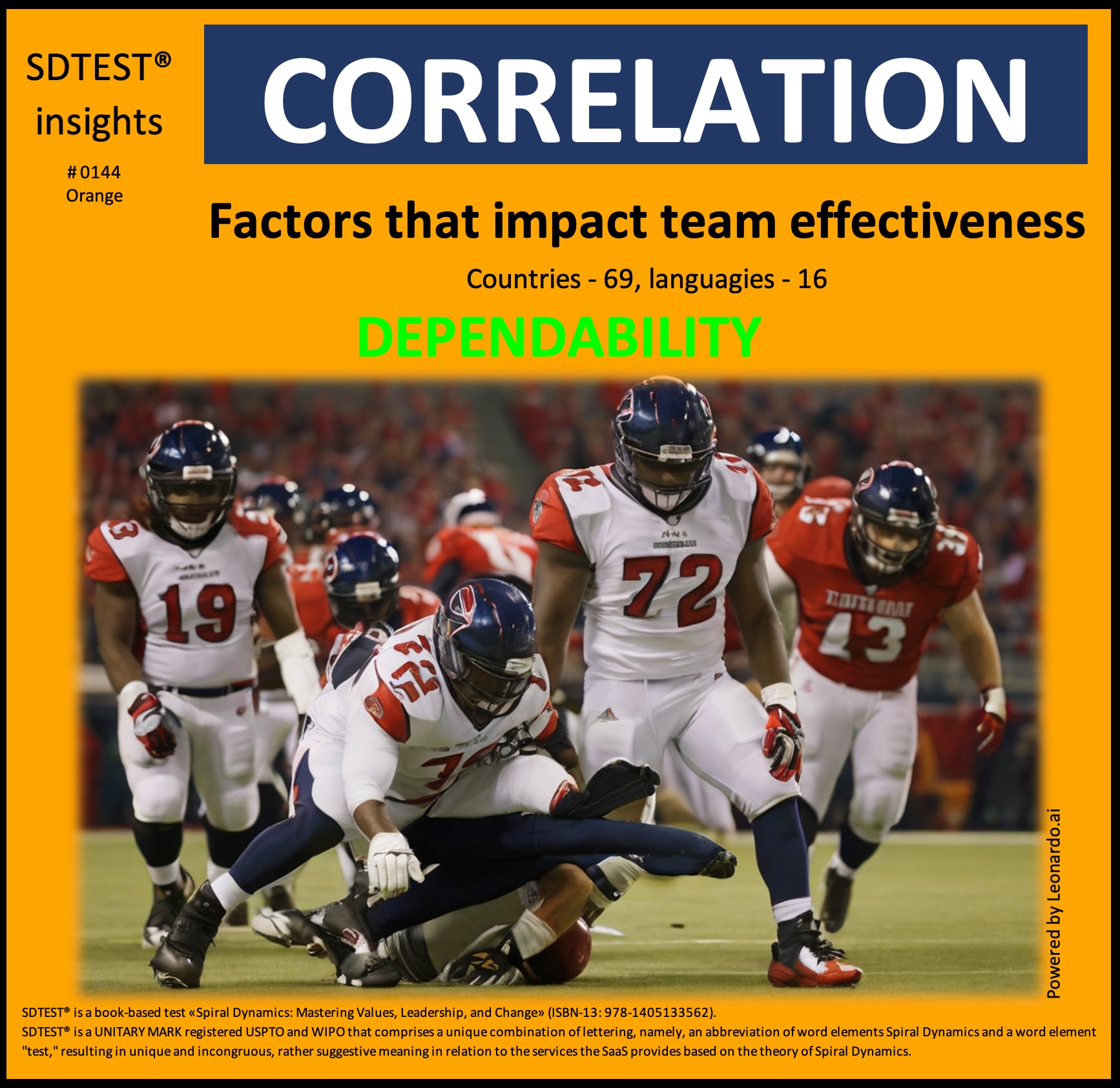Mastering Values, Leadership, and
Change» (ISBN-13: 978-1405133562)

SDTEST® has 33 different VUCA polls that calculate the 12,299 correlation values between stages of development according to the theory of Spiral Dynamics and answer options of these 33 polls.
We invite curiosity about the systemic mechanisms behind this correlation. There may be hidden variables that provide alternative explanations.
0.0864 between the Empathetic and the Purple stage.
The critical value of the correlation coefficient for a non-normal distribution, by Spearman r = 0.0017. This positive correlation of 0.0864 meets the reliability criteria but does not necessarily imply causation.

This positive correlation of 0.0864 suggests that within the Purple value system, there is a trend toward valuing empathy, compassion, and understanding as crucial qualities for successful leadership.
It could be explained from three points of view:
Companies operating within the Purple value system would likely view this positive correlation as an indication of the importance placed on tradition, spirituality, and community. This positive correlation suggests that as the level of Purple increases, there is a greater likelihood of empathetic leadership. Companies may prioritize initiatives that foster a culture of empathy, compassion, and understanding within their organization, recognizing the importance of building solid relationships with their employees and the community. By emphasizing the values of tradition, spirituality, and community, companies can enhance their overall performance and contribute to a more harmonious and prosperous work environment.
Within teams operating in the Purple value system, this positive correlation may indicate a potential emphasis on empathy and compassion as crucial qualities for successful leadership. Team members may prioritize building solid relationships with each other and their leader, recognizing the importance of empathy and understanding in achieving their goals. To address this, teams may need to develop strategies that promote empathy, active listening, and conflict resolution and prioritize initiatives that foster a culture of compassion and understanding within the team.
For individuals operating within the Purple value system, the positive correlation between "Empathetic" and the Purple stage may reflect a deep concern for the well-being of others and the importance of building solid relationships. These individuals may view empathy as a critical aspect of leadership and prioritize personal growth in emotional intelligence, self-awareness, and conflict resolution to navigate interactions effectively. By embracing a mindset of compassion and understanding, individuals can contribute to a more harmonious and prosperous work environment, both personally and professionally.
0.3376 between the Age group 18-24 and the Red stage.
The critical value of the correlation coefficient for a normal distribution, by William Sealy Gosset (Student) r = 0.1985. This positive correlation of 0.3376 meets the reliability criteria but does not necessarily imply causation.

This positive correlation of 0.3376 suggests that the Red value system values individualism, self-expression, and power. Companies, teams, and individuals operating within this value system may prioritize initiatives that promote collaboration, active listening, and conflict resolution, enhancing overall performance and contributing to a more prosperous and harmonious work environment.
It could be explained from three points of view:
Companies operating within the Red value system would likely view this positive correlation as an indication of the importance placed on individualism, self-expression, and power. This positive correlation suggests that younger individuals (18-24 years old) are more likely to be driven by their impulses and desires and may be more resistant to change. Companies may need to develop strategies to engage and motivate this age group, recognizing their desire for immediate gratification and tendency to act on their impulses. By understanding the values and motivations of this age group, companies can enhance their overall performance and contribute to a more prosperous and dynamic work environment.
Within teams operating in the Red value system, this positive correlation may indicate a potential emphasis on individualism and self-expression. Team members may prioritize their needs and desires over the team's needs and may be more resistant to change. To address this, teams may need to develop strategies that promote collaboration, active listening, and conflict resolution and may prioritize initiatives that foster a culture of mutual respect and understanding. By embracing a mindset of teamwork and cooperation, teams can enhance their overall performance and contribute to a more prosperous and harmonious work environment.
For individuals operating within the Red value system, this positive correlation may reflect a deep desire for individualism, self-expression, and power. These individuals may view change as threatening their autonomy and may be more resistant.
-0.2316 between the Ability to ask for help / Moderately Agree and the Blue stage.
The critical value of the correlation coefficient for a normal distribution, by William Sealy Gosset (Student) r = 0.1985. This negative correlation of -0.2316 meets the reliability criteria but does not necessarily imply causation.

This negative correlation of -0.2316 suggests a reluctance to ask for help.
It could be explained from three points of view:
For companies within the Blue value system, this negative correlation suggests a potential challenge in fostering a culture that values order, rules, and tradition while encouraging individuals to seek help. This negative correlation indicates that as individuals moderately agree with the ability to ask for help, there may be a tendency towards conformity and strict adherence to rules within the organization. Companies should focus on promoting a balance between following established protocols and encouraging open communication and collaboration. Companies can enhance teamwork and individual growth by fostering an environment that values both structure and support.
Within teams in the Blue value system, this negative correlation may indicate a potential reluctance to ask for help among team members who moderately agree with this ability. This could stem from a strong sense of duty and responsibility, leading team members to prioritize self-reliance and adherence to rules over seeking assistance. To address this, teams may need to develop strategies that promote open communication, trust, and a supportive team environment. Encouraging team members to ask for help can enhance collaboration, problem-solving, and overall team performance.
For individuals embodying the Blue value system, this negative correlation may reflect a strong sense of duty and responsibility that may hinder their willingness to seek assistance. Individuals who moderately agree with the ability to ask for help may find it challenging to prioritize their own needs over conforming to established norms and rules. To navigate this, individuals must develop assertiveness, communication, and emotional intelligence skills to overcome barriers to seeking help when necessary. By fostering a culture that values independence and collaboration, individuals can enhance their personal growth and contribute to a more supportive and effective team environment.
0.1031 between the Dependability and the Orange stage.
The critical value of the correlation coefficient for a normal distribution, by William Sealy Gosset (Student) r = 0.06. This positive correlation of 0.1031 meets the reliability criteria but does not necessarily imply causation.

This positive correlation of 0.1031 suggests that there is a trend toward valuing dependability as a factor in team effectiveness within the Orange value system.
It could be explained from three points of view:
Companies operating within the Orange value system would likely view this positive correlation as an indication of the importance placed on reason, science, and technology. This positive correlation suggests that as the level of Orange increases, there is a greater likelihood of valuing dependability as a factor in team effectiveness. Companies may prioritize initiatives that foster a culture of reliability, consistency, and accountability within their organization, recognizing the importance of dependable team members in achieving their goals. Companies can enhance their overall performance by emphasizing the values of reason, science, and technology and contribute to a more prosperous and efficient work environment.
Within teams operating in the Orange value system, this positive correlation may indicate a potential emphasis on dependability as a quality for team members. Team members may prioritize being reliable, consistent, and accountable in their work, recognizing the importance of dependability in achieving their goals. To address this, teams may need to develop strategies that promote clear communication, task management, and individual accountability and prioritize initiatives that foster a culture of dependability.
For individuals operating within the Orange value system, this positive correlation may reflect a commitment to reason, science, and technology. These individuals may view dependability as a critical aspect of being a valuable team member. They may prioritize personal growth in time management, task prioritization, and communication to enhance their reliability. By embracing a mindset of dependability and accountability, individuals can contribute personally and professionally to a more prosperous and efficient work environment.
0.1403 between the Good relationship with colleagues and the Green stage.
The critical value of the correlation coefficient for a normal distribution, by William Sealy Gosset (Student) r = 0.0641. This positive correlation of 0.1403 meets the reliability criteria but does not necessarily imply causation.

This positive correlation of 0.1403 suggests that within the Green value system, there is a trend toward valuing solid interpersonal relationships as a critical priority for job seekers.
It could be explained from three points of view:
Companies operating within the Green value system would likely view this positive correlation as an indication of the importance placed on community, ecology, and the well-being of all. This positive correlation suggests that as the level of Green increases, job seekers are more likely to prioritize positive relationships with their colleagues. Companies may prioritize initiatives that foster a culture of unity, cooperation, and sustainability within their organization, recognizing the importance of strong interpersonal relationships in achieving their goals. By emphasizing the values of community and ecology, companies can enhance their overall performance and contribute to a more harmonious and prosperous work environment.
Within teams operating in the Green value system, this positive correlation may indicate a potential emphasis on collaboration and mutual support. Team members may prioritize building solid relationships with their colleagues, recognizing the importance of unity and cooperation in achieving their goals. To address this, teams may need to develop strategies that promote open communication, active listening, and conflict resolution and may prioritize initiatives that foster a culture of mutual respect and understanding within the team.
For individuals operating within the Green value system, this positive correlation may reflect a deep concern for the well-being of others and the importance of building solid relationships. These individuals may view positive relationships with colleagues as a critical aspect of job satisfaction. They may prioritize personal growth in emotional intelligence, empathy, and conflict resolution to navigate interactions effectively. By embracing a mindset of cooperation and mutual support, individuals can contribute personally and professionally to a more harmonious and prosperous work environment.
0.1083 between the Climate change and the Yellow stage.
The critical value of the correlation coefficient for a normal distribution, by William Sealy Gosset (Student) r = 0.0509. This positive correlation of 0.1083 meets the reliability criteria but does not necessarily imply causation.

This positive correlation of 0.1083 suggests that within the Yellow value system, there is a trend towards valuing personal growth, development, and holistic approaches to addressing complex issues like climate change
It could be explained from three points of view:
For companies within the Yellow value system, this positive correlation may indicate a focus on holistic, integrative approaches to addressing complex issues like environmental challenges. This correlation suggests that as the level of Yellow increases, there is a greater awareness and concern for global issues such as climate change. Companies may prioritize initiatives that promote sustainability, innovation, and a comprehensive understanding of complex systems in their operations. By emphasizing the values of personal growth, development, and multiple perspectives, companies can contribute to positive change and environmental stewardship, aligning with the holistic approach of the Yellow value system.
Within teams in the Yellow value system, this positive correlation may signal a team's ability to see multiple perspectives and address complex challenges collaboratively. Team members may demonstrate a holistic understanding of environmental issues and work towards sustainable solutions. To leverage this correlation, teams may foster a culture of innovation, creativity, and systems thinking to tackle climate change and other pressing issues. By encouraging diverse viewpoints and personal growth, teams can enhance their problem-solving capabilities and contribute to meaningful change within their organization and beyond.
For individuals embodying the Yellow value system, this positive correlation may reflect a deep commitment to personal growth, development, and understanding of complex systems. These individuals may exhibit solid environmental awareness and a desire to address global challenges like climate change through integrative and sustainable approaches. By embracing a mindset of multiple perspectives and holistic thinking, individuals can contribute to positive change, advocate for environmental sustainability, and engage in initiatives that promote a more harmonious relationship with the planet. This correlation underscores the importance of personal growth and a comprehensive understanding of complex issues in addressing global challenges.
0.1084 between the I notice ageism in personal life and the Turquoise stage.
The critical value of the correlation coefficient for a normal distribution, by William Sealy Gosset (Student) r = 0.0832. This positive correlation of 0.1084 meets the reliability criteria but does not necessarily imply causation.

This positive correlation of 0.1084 suggests that within the Turquoise value system, there is a trend towards valuing inclusivity, diversity, and social awareness.
It could be explained from three points of view:
For companies within the Turquoise value system, this positive correlation may indicate a strong commitment to inclusivity, diversity, and social awareness. This correlation suggests that as the level of Turquoise increases, there is a greater sensitivity to issues of ageism and a focus on promoting equality and respect for all individuals. Companies may prioritize initiatives that foster a culture of inclusiveness, empathy, and social responsibility within their organization, recognizing the importance of valuing individuals of all ages. By emphasizing the values of interconnectedness and compassion, companies can enhance their overall performance and contribute to a more harmonious and inclusive work environment.
Within teams in the Turquoise value system, this positive correlation may signal a team's commitment to social justice, equality, and inclusivity. Team members may demonstrate a deep understanding of ageism and work towards creating a supportive and respectful team environment for individuals of all ages. To leverage this correlation, teams may focus on fostering a culture of empathy, understanding, and advocacy for social causes. By encouraging open dialogue, mutual respect, and a commitment to diversity, teams can enhance their cohesion and effectiveness in addressing societal issues like ageism.
For individuals embodying the Turquoise value system, this positive correlation may reflect a strong sense of social awareness, empathy, and a commitment to promoting inclusivity and equality. These individuals may actively address ageism and advocate for social justice in their personal lives. By embracing a mindset of compassion, understanding, and social responsibility, individuals can create a more inclusive and respectful society. This correlation underscores the importance of recognizing and addressing ageism as part of a holistic approach to social issues.
What insights do you gain from today's correlation? How might we study this relationship more carefully before deducing causation?
We welcome respectful and wise perspectives! Stay tuned every week as we share more results and insights.
After login or registration, free access to the poll results in the FAQ section.
[1] https://www.linkedin.com/in/mchalesiobhan
[2] https://www.linkedin.com/in/jeremiah-teo-%E8%B5%B5%E6%B1%89%E6%98%87-334918112/
